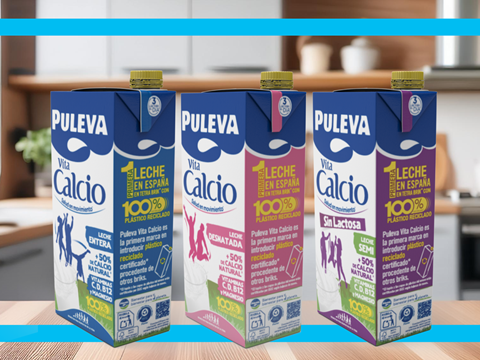
A new carton package from Tetra Pak and Lactalis incorporates certified recycled polymers from used beverage cartons into dairy packaging; this is hoped to help reduce the industry’s reliance on finite, fossil-based virgin materials.
In a reported ‘first for the beverage carton industry’, ISCC PLUS has certified the material as originating from the recycling process for used beverage cartons in Spain.
It is allocated to the pack using a mass balance approach, meaning that the pack combines recycled and virgin fossil feedstock. The corresponding volume of recycled material is sourced and tracked throughout the supply chain in a process verified by a third-party auditor, aligning with the ISCC Chain of Custody Procedure.
Since the material is chemically recycled, Tetra Pak and Lactalis assert that the polymers do not impact the quality, food safety, or any other functional features of the carton.
As such, Lactalis’ Puleva dairy range – namely its calcium skimmed, semi-skimmed, whole, and lactose-free milk – will be packaged in Tetra Brik Aseptic 1000 Slim cartons and the HeliCap 23 Pro closure.
This development is believed to keep high-quality reaources in the loop while assisting in the transition away from virgin, fossil-based materials.
Going forward, Lactalis plans to gradually introduce packaging containing certified recycled polymers into its other dairy offerings.
Both companies emphasize their commitment to sustainability-minded developments; Tetra Pak intends to invest an annual sum of €100 million into its efforts for the next five to ten years, and Lactalis names responsible packaging, the circular economy, and the decarbonization of all its activities by 2050 among its top priorities.
Additionally, Tetra Pak cites its own research in its suggestion that 78% of consumers are concerned about the environmental impact of plastic waste, while 29% report that they have purchased more products packaged in recycled materials over the last year.
“Our collaboration with Tetra Pak is rooted in a shared vision and commitment to environmental stewardship for future generations, facilitated by circular economy principles,” says Joël Llovera, purchasing director at Lactalis Iberia. “Packaging innovation plays a crucial role in this endeavour.
“We are dedicated to sustainable progress. Transitioning from fossil-based polymers to recycled ones, certified by ISCC PLUS as linked to used beverage cartons, represents a significant stride towards our objective.”
Marco Marchetti, vice president Packaging Materials, Sales and Distribution Solutions, Tetra Pak, adds: “Increasing the usage of renewable and recycled resources in packaging is critical if we are to help food and beverage producers realise material circularity, turning waste into new resources and lowering reliance on virgin, fossil-based materials.
“To scale up the adoption of certified recycled polymers in food packaging, we need collective action across the entire system and enabling legislation. Scientists, policymakers, recyclers, industry players and others must work together to turn challenges into opportunities, as shown by our world-first introduction with Lactalis.”
The news comes after last year’s partnership between Tetra Pak and Stora Enso, in which the companies made a joint investment of €29 million to open a new recycling line for post-consumer beverage cartons in Ostrołęka, Poland. As it commenced operations, the facility expected to triple the country’s annual recycling capacity for beverage cartons.
More recently, Bonafarm’s Sole-Mizo has adopted SIG’s SIG MidiBloc and SIG MidiFit carton packs for its extended shelf life and ultra-high temperature milks. The packs claim to enable drip-free pouring, easy opening and closing, and vertical and horizontal storage, and are applied to Sole-Mizo’s products with SIG’s Midi 12 Aseptic filling machine.
If you liked this story, you might also enjoy:
The ultimate guide to the Packaging and Packaging Waste Regulation in 2024
How are the top brands progressing on packaging sustainability?
Sustainable Innovation Report 2024: Current trends and future priorities
Everything you need to know about global plastic sustainability regulation














No comments yet